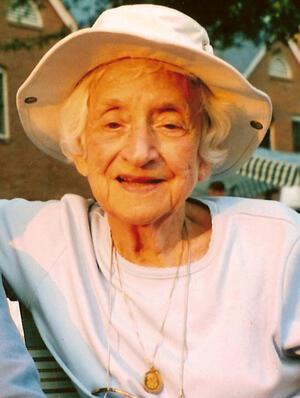Henriette Avram
Contrary to popular opinion, librarians have been leaders in the digital revolution, and Henriette Avram was one of the most prominent members of the vanguard. With no formal training as a librarian—indeed without a college degree—she almost single-handedly developed MARC, the file format that makes books and other forms of information discoverable. The catalog records which library users see on their screens everywhere in the western world today are created using MARC, which stands for “machine-readable cataloging” (or as Henriette Avram’s son, Lloyd, said for “Mother Avram’s Remarkable Contribution”).
Born Henriette Davidson in New York in 1919, she grew up hoping for a career in medicine. She was a frequent visitor to the local public library and took two years of pre-med courses at Hunter College. Like many young women of her generation, she left college when she married Herbert Mois Avram, a math whiz who went on to become a decorated Navy veteran and a chess master who once beat Bobby Fischer. She was 21 years old.
After the war, the couple began a family. In 1952, they moved with their three young children to the Washington suburbs so that Herbert could take a job with the National Security Agency (NSA). Henriette enrolled in math classes at George Washington University and began working at NSA, too. There she became a member of the pioneering generation of computer programmers, one of only about 100 people in the world who was programming on a computer.
This was followed by a stint as a systems analyst and programmer at the American Research Bureau and then Datatrol, the second software company in the country. At Datatrol, her attempt to organize the firm’s library brought her into contact with cataloging concepts. Becoming more and more interested in the idea of a bibliographic utility—a tool for sharing automated, cataloged information about books—she took a position as a systems analyst at the Library of Congress (LC), where she would become “the Mother of MARC.”
Avram took the standard catalog card that was in use in libraries at the time and coded and sub-coded each of its elements, dividing them into tagged fields that a computer could read. Libraries were already practicing shared cataloging—the idea that an item need only be cataloged once, by one cataloging agency that would then share it with others—with LC as a kind of clearinghouse, using the postal service to distribute the results of its own cataloging work and that of contributing research libraries. MARC made it possible to distribute catalog information on computer tapes and later in large files through the File Transfer Protocol.
MARC is successful because it is a standard. Avram retained and magnified the ease of use of the card catalog. A catalog card could be filed in any library; the MARC format can be used in any library. In an environment of competing technological formats—from VHS vs. Beta to Mac vs. Windows to Kindle vs. iBook—users can lose access to information just by making the wrong purchase. MARC is the only file standard for bibliographic utility. It is universal.
The advent of digital media poses the first serious challenge to MARC, which was invented primarily to describe hard copy and physical formats. The cataloging world may eventually develop a new framework, but the MARC records that have already been created will be used indefinitely.
MARC was fully implemented in 1971, the year it became a standard of the American National Standards Institute and Henriette Avram was awarded a Margaret Mann Citation. The cataloging world’s highest honor had never before gone to someone who was not a librarian.
The acceptance of MARC took place in an amazingly short time. Avram joined LC in 1965, and by 1973, MARC was in widespread use. Most veteran librarians from those years attribute MARC’s success to Avram’s personal qualities as much as to MARC itself. She is remembered as a dynamic, inspiring leader, full of energy, writing and speaking internationally to promote the MARC standard and making friends wherever she went.
Although not a trained librarian herself, she won nearly every award given in the field. The honor that meant the most to her was the Federal Woman’s Award presented to her by the Librarian of Congress in 1974. “This,” recalled her daughter Marcie, “was my mother’s proudest moment. She never took off the medallion she received that evening. It was around her neck until the day she died.”
Henriette Avram was devoted to her husband and outlived him by only three months, dying on April 22, 2006. They are buried together at Arlington National Cemetery.




I'm not surprised to find that Marcie Avram had such a distinguished mother. I met Henriette once, when Marcie and I were sorority sisters at the University of Maryland. I had no idea of her prominence in her field, but was suitably impressed by her warmth and hospitality when I visited the Avram home. Marcie was hands down the smartest, wittiest, and most interesting girl in our Gamma Phi Beta Chapter. She obviously was fortunate enough to inherit her illustrious mother's fine characteristics. Shirley Colee, nee Johnson
Was she Jewish?
Your article about Henriette Avram was wonderful. Although she was my 'second mother' and role model, I learned a lot more about the detail of her enduring contribution to knowledge management. I'd just like to say that she was also inspiring as a mother and salad maker. The Avram household was always warm, welcoming, and nourishing in food and thought.